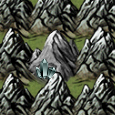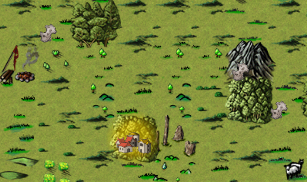In the largest single release in the game’s history, the game economy of Illyriad, the acclaimed HTML5 massively multiplayer online strategy game, sees a dramatic expansion today, with new commodities, equipment, an expanded gathering system, crafting system and an expanded regional trade system.
The previous 17 resources which could be traded in Illyriad are joined by hundreds of new items, ranging from grapes and wine to rare minerals and magical ingredients. With many commodities available only in specific parts of the game world, and some extremely rare, this opens up the possibility for elaborate player trade and crafting strategies, extending to monopolies and cartels.
“This huge expansion in trade, and the whole crafting system that we are bringing in, opens up new choices for player specialisation. Specialist traders and specialist manufacturers will both have an important place in Illyriad going forward,” explained Illyriad’s founder, James Niesewand. “Illyriad has always been praised for its depth, and this release does add more depth. For example, military players previously had 8 basic troop types to choose from, but with the new equipment produced by crafting there will be thousands of possible troop load-outs, allowing players to customise their soldiers for different missions, terrains and even climates. So, for the military players, yes, there is more depth. But what this update really adds to Illyriad is breadth, allowing players to explore complex trading and manufacturing strategies.”
This update includes:
- 72 new weapons
- 53 new armour types
- 9 new mounts
- 13 new specialist buildings
- More than 50 new special resource types
- Dozens of items lootable from animals
- 187 new technologies to research, ranging from Wine Making, to Faction Markets, to Obsidian Blade
With such a dynamic change to the game, the full impact of the release could take several months to be felt by the players of Illyriad. All of the new buildings, equipment, researches and commodities in the release go live at the end of this week.
—
About Illyriad:
“An epic RTS but with killer lore and an awesome community.” – Massively.com
“I could tell right away that this game was special.” – ThriftyGamer
“Illyriad has a great niche…. There is plenty to do and I would suggest that everyone with a few minutes goes and checks it out.” – Vagary.tv
https://www.illyriad.co.uk/press/Reviews
Illyriad is a browser-based Massively Multiplayer strategy game, in which players take control of cities, engaging in city-building, quests, diplomacy, warfare and trade. Developed by London-based Illyriad Games Ltd., Illyriad went live in 2010 and was officially launched on May 16th 2011.
https://www.illyriad.co.uk/
For further information, please contact: press@illyriad.co.uk
Press assets are available at ftp.illyriad.co.uk , and further assets, quotes, interviews, etc., are available on request.


 Trade is based on the notion that you swap what you do not need or do not want, for something you do need or want. For example, you want a new car and you have more money than you need, so you buy a car from a dealership which has cars but needs money. Or perhaps you are better at playing a certain sport than anyone else on Earth, so you swap your time for vast quantities of money at one of the top clubs (and then, oh, the cars you will buy!)
Trade is based on the notion that you swap what you do not need or do not want, for something you do need or want. For example, you want a new car and you have more money than you need, so you buy a car from a dealership which has cars but needs money. Or perhaps you are better at playing a certain sport than anyone else on Earth, so you swap your time for vast quantities of money at one of the top clubs (and then, oh, the cars you will buy!)
 Our last blog piece happened to mention Obsidian Mines. Obsidian Mines are unusual and I’ll get to explaining them in a minute. But first, let’s start with something easy, Silverthorn.
Our last blog piece happened to mention Obsidian Mines. Obsidian Mines are unusual and I’ll get to explaining them in a minute. But first, let’s start with something easy, Silverthorn. But what do you do with your Silverthorn? This is not a herb you will need every day. It isn’t used for weapon making, and you probably only want to use one piece every couple of months, at least in times of peace. There are 80-90 patches of Silverthorn on the map, each potentially yielding two dozen pieces of Silverthorn herb each day. So what do you do?
But what do you do with your Silverthorn? This is not a herb you will need every day. It isn’t used for weapon making, and you probably only want to use one piece every couple of months, at least in times of peace. There are 80-90 patches of Silverthorn on the map, each potentially yielding two dozen pieces of Silverthorn herb each day. So what do you do? And in addition, where animals are slain patches of Hides, including rare animals parts, will be left behind (as in this image). And there are also minerals. Which brings us back to Obsidian.
And in addition, where animals are slain patches of Hides, including rare animals parts, will be left behind (as in this image). And there are also minerals. Which brings us back to Obsidian. What equipment is ideal will also depend upon the exact mission, as well as a player’s strategy. For example, when sending your Dwarven Halbardiers to defend a neighbouring settlement from an unexpected attack, you may want them to carry lighter than usual equipment so that they can get to their destination as fast as possible, before the attack strikes.
What equipment is ideal will also depend upon the exact mission, as well as a player’s strategy. For example, when sending your Dwarven Halbardiers to defend a neighbouring settlement from an unexpected attack, you may want them to carry lighter than usual equipment so that they can get to their destination as fast as possible, before the attack strikes. If they are to defend a wooded tournament square, then perhaps you want them to carry only shorter spears and armour adapted for woodland combat, so that they get bonuses based on that terrain.
If they are to defend a wooded tournament square, then perhaps you want them to carry only shorter spears and armour adapted for woodland combat, so that they get bonuses based on that terrain. If you want the same units to defend a nearby Obsidian Mine, then you may want really heavy armour that gives a bonus in defence and Pikes to fend of cavalry raiders, and as the troops won’t move often you won’t much care how much this bulky equipment slows their movement. And so on.
If you want the same units to defend a nearby Obsidian Mine, then you may want really heavy armour that gives a bonus in defence and Pikes to fend of cavalry raiders, and as the troops won’t move often you won’t much care how much this bulky equipment slows their movement. And so on.